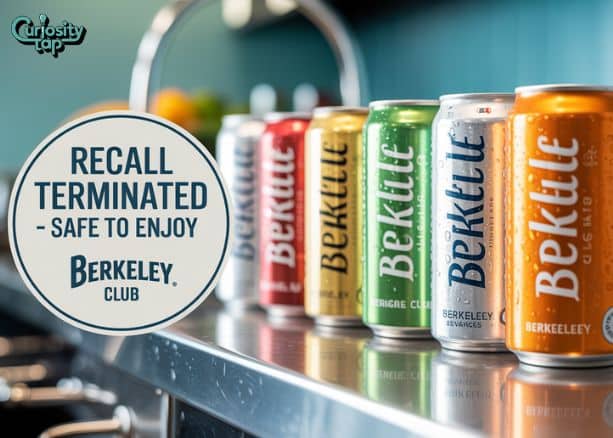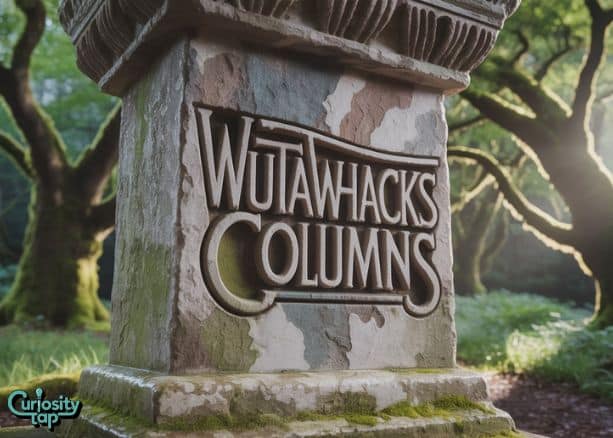When the U.S. Food and Drug Administration (FDA) announces a recall, consumers immediately ask two questions:
Was it dangerous? and Can I trust this brand again?
That’s exactly what happened with the Berkeley Club Beverages recall involving bottled water products distributed in parts of the United States.
The good news: as of November 13, 2024, the recall has officially been terminated.
Let’s unpack what happened, why the Berkeley Springs Water recall matters, and what you as a consumer should know moving forward.
Quick Facts at a Glance
| Detail | Information |
|---|---|
| Company | Berkeley Club Beverages, Inc. |
| Products recalled | Berkeley Springs Purified Water (1-gallon & 5-gallon plastic), Berkeley Springs Distilled Water (1-gallon & 5-gallon plastic) |
| Batch codes | 090326, 090426, 090526, 090626 |
| Issue | Possible coliform bacteria contamination |
| Recall initiated | September 12, 2024 |
| FDA classification | Class III recall (November 8, 2024) |
| Recall terminated | November 13, 2024 |
| States impacted | West Virginia, Maryland, Virginia |
| Bottles recalled | Approx. 151,397 bottles |
| Illnesses reported | None confirmed |
Why the Recall Happened
The recall began because testing revealed the presence of coliform bacteria in certain batches of Berkeley Springs Water.
While coliforms themselves aren’t always harmful, their presence indicates potential contamination pathways that could allow Escherichia coli (E. coli) or even Clostridium botulinum (botulism) to thrive if sanitation standards fail.
Under federal safety regulations, bottled water must meet strict food safety rules.
Even the risk of contamination is considered a public health concern, which is why this was flagged as a voluntary recall.
Products Affected & How to Identify Them
Consumers were advised to check their bottles for the following details:
- Berkeley Springs Purified Water – 1-gallon and 5-gallon plastic containers
- Berkeley Springs Distilled Water – 1-gallon and 5-gallon plastic containers
- Batch codes: 090326, 090426, 090526, 090626
- Still water (non-carbonated, non-flavored) only
- Not included: Juices, sodas, sparkling beverages, or energy drinks
If you purchased bottled water from supermarkets, small retail shops, or through beverage suppliers in West Virginia, Maryland, or Virginia, your product could have been part of the recall.
Timeline: From Start to Termination
- September 12, 2024 – Recall initiated by Berkeley Club Beverages, Inc. after routine batch testing & QA (quality assurance) detected coliform bacteria.
- October 2024 – Products quarantined, removed from supermarkets, third-party distributors, and small retail shops.
- November 8, 2024 – FDA officially classified the recall as a Class III recall, meaning the chance of adverse health effects was low.
- November 13, 2024 – Recall terminated after the FDA verified corrective actions and found no ongoing risk.
The total duration: just over two months.
What Does “Recall Terminated” Actually Mean?
According to the FDA Food Recall Database, a termination notice is issued when the agency determines that all actions are complete, including:
- Removal of affected products from circulation
- Quarantine & destruction of unsafe bottles
- Verification that manufacturing has corrected the issue
- Confirmation no further regulatory oversight is required
So, when you see “Berkeley Club Beverages recall terminated,” it means the recall has officially ended, and the affected products are no longer considered a threat.
Was Berkeley Club Water Ever Unsafe?
This is the question most consumers care about.
The presence of coliform bacteria doesn’t automatically make water unsafe. However, it signals that contamination could have occurred due to lapses in sanitary bottling or packaging safety. Importantly:
- No illnesses were confirmed.
- No cases of botulism, E. coli contamination, or related foodborne illnesses were reported.
- The recall was precautionary, designed to prevent a possible public health concern.
Clarifying the Product: Water, Soda, or Juice?
Some confusion spread online, with rumors suggesting juices or sodas were involved. To clarify:
- Only still water products were recalled.
- No sparkling beverages, energy drinks, or juices were affected.
- Brands like Berkeley Springs Water are strictly non-carbonated bottled water.
Who Ordered the Recall & How Long It Lasted
This was a voluntary recall initiated by Berkeley Club Beverages, Inc. but monitored under regulatory oversight by the Food and Drug Administration (FDA).
The recall lasted: September 12 – November 13, 2024. That’s about two months, shorter than many water-related recalls that can stretch for half a year.
Where the Products Were Sold
The affected water was distributed mainly in the Eastern United States, focusing on:
- West Virginia (particularly Berkeley Springs)
- Maryland
- Virginia
Sales channels included:
- Supermarkets (regional grocery chains)
- Small retail shops
- Beverage suppliers and third-party distributors
How Berkeley Club Fixed the Problem
Berkeley Club Beverages, Inc. took several corrective steps:
- Batch testing & quality assurance upgrades
- New sanitation standards in bottling facilities
- Stricter traceability of lot numbers and packaging safety checks
- Close cooperation with the FDA until termination notice issued
By complying fully with federal safety regulations, the company earned the FDA’s clearance to close the recall.
The Role of the FDA & Regulators
The Food and Drug Administration (FDA) monitors recalls through its Recalls, Market Withdrawals & Safety Alerts system.
Key roles included:
- Reviewing the company’s product recall strategy
- Classifying the recall (Class III in this case)
- Confirming quarantine & destruction of unsafe products
- Issuing the final termination notice
This kind of regulatory oversight reassures consumers that recalls aren’t left unfinished.
Public Health Impact & Verified Harm
Unlike some food and drink safety crises, this one had minimal impact:
- Illnesses reported: None confirmed
- Hospitalizations: Zero
- No evidence of E. coli or Clostridium botulinum infections linked to the recall
In short: a public health concern, but no actual outbreak.
Are Other Products Affected?
No. Only the batch codes 090326, 090426, 090526, 090626 of Berkeley Springs Purified Water and Distilled Water were recalled.
Consumers can safely drink other Berkeley Club Beverages products, as they were unaffected and continue to meet sanitation standards.
Is It Safe to Drink Again?
Yes. Once the recall terminated, it meant:
- The FDA verified all corrective actions.
- Unsafe batches were destroyed.
- Manufacturing and quality assurance processes were improved.
If your bottle doesn’t match the affected batch codes, it’s safe to drink.
What Consumers Should Do Next
- Check your bottles: Look for batch codes 090326, 090426, 090526, 090626.
- Dispose safely: Don’t drink affected bottles.
- Refunds & replacements: Retailers and supermarkets offered refunds during the recall.
- Stay alert: Sign up for food recall alerts.
Staying Informed: Recall Tracking Tools
To stay ahead of future issues, use:
- FDA Food Recall Database → FDA Recalls, Market Withdrawals & Safety Alerts
- Recall tracking tools by retailers and apps
- Subscription services like Top Class Actions, Real Simple, or updates in Newsweek, Food & Wine, and blue-community.net
Food Safety Concepts Behind the Recall
The recall highlighted several food safety rules:
- Low-acid canned beverages (like water) require strict sanitary bottling
- Heat-processing / thermal processing and pasteurization are critical for juices but not bottled water
- Traceability via lot numbers is essential
- Preventive recalls protect consumer trust even when no illnesses are reported
Preventing Future Recalls
Companies like Berkeley Club Beverages, Inc. now implement:
- Stricter batch testing
- Better sanitation standards
- Consumer monitoring for faster reporting
- Stronger packaging safety procedures
These steps aim to reduce risks and protect public health.
FAQs
Q: What caused the recall?
Coliform bacteria detected in some batches.
Q: What is a Class III recall?
A recall where health risk is considered low but still requires corrective action.
Q: Could this have become a botulism issue?
No cases were found. The risk was precautionary.
Q: Can I drink other Berkeley Club products?
Yes, only certain water batches were recalled.
Q: How do I know if I have an affected bottle?
Check batch codes 090326, 090426, 090526, 090626.
Q: Is the product safe now?
Yes. The FDA terminated the recall, confirming it’s safe.
Why This Recall Matters
The Berkeley Springs Water recall shows how food safety systems work in practice:
- Consumer trust depends on quick action.
- Even minor contamination risks trigger recalls.
- Regulatory oversight protects the public before harm occurs.
It’s a lesson in risk prevention and transparency in the bottled water industry.
Final Thoughts
The Berkeley Club Beverages Recall Terminated event may not have caused illnesses, but it reinforced the importance of product safety, traceability, and regulatory oversight.
For consumers, the key takeaway is simple: always check recall notices, trust the process, and know that most recalls are precautionary rather than reactive.
By acting quickly, Berkeley Club Beverages, Inc. safeguarded both its reputation and consumer health. The FDA’s termination notice confirms what matters most you can safely enjoy Berkeley Springs Water again.
Read more knowledgeable blogs on Curiosity Tap
Is this article helpful?

Jackson Pearson is a passionate educator and language enthusiast behind the blog Jackson Pearson. With years of experience in teaching and writing, he specializes in simplifying complex grammar rules, breaking down tricky vocabulary, and crafting learning guides that are both engaging and practical. His mission is to help readers boost their English skills whether they’re beginners or brushing up for fluency. Through every article, Jackson brings clarity, structure, and a spark of curiosity to the world of English learning.



